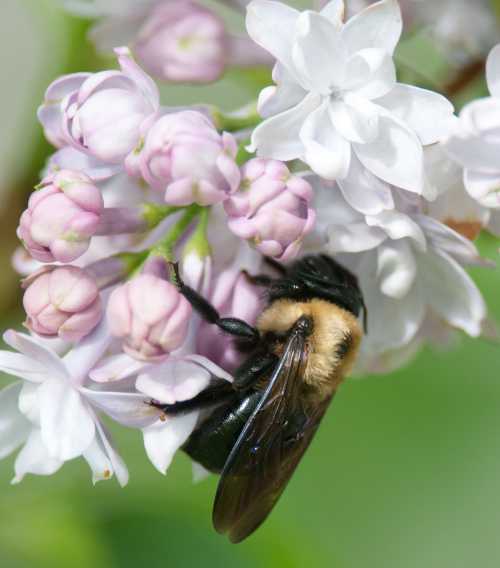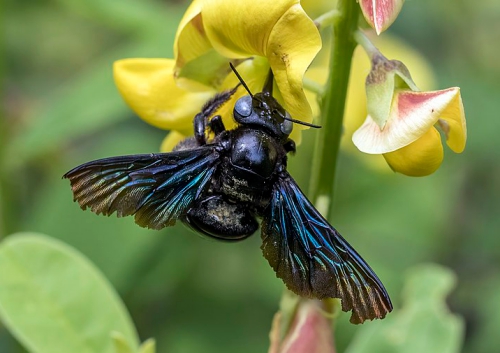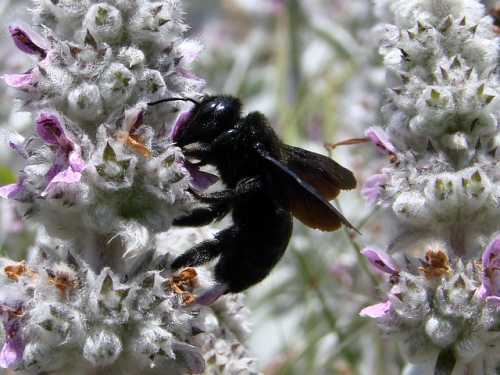Can Carpenter Bees Sting You?
Can carpenter bees sting you?
The short answer is:
Yes, females carpenter bees can sting, although carpenter bees are not known to be aggressive species. If you are seemingly being followed, chased, or investigated by a carpenter bee, it's probably a male (for reasons explained below). Male carpenter bees cannot sting.
Can Carpenter Bees Sting You? Here's What We Know About Carpenter Bee Stings
 Eastern carpenter bee
Eastern carpenter beeNot only do we know that carpenter bees can sting, we also have an idea about how painful it is in comparison with some other stinging insects, like wasps and other bees.
How do we know? Because scientific research has explored this topics.
If you are feeling intimidated by large carpenter bees, the following information may put your mind at rest.
How painful are female carpenter bee stings?
 Xylocopa latipes, also known as the 'tropical carpenter bee' or 'giant Bornean bee'. Photograph by Charles J Sharp (see ref 2.
Xylocopa latipes, also known as the 'tropical carpenter bee' or 'giant Bornean bee'. Photograph by Charles J Sharp (see ref 2.The most painful bee sting we know about, happens to be the sting of a tropical large carpenter bee species, Xylocopa latipes, also known as the tropical carpenter bee or 'giant Bornean bee'. It's found in Southeast Asia, so if you live in Europe or the US, for example, it's not something to worry about.
But even if you were stung by this species, would it hurt that much?
According to the Schmidt Sting Pain Index1, despite being the most painful bee sting recorded, the giant Bornean carpenter bee only scores mid-way on the pain scale. The California and Nocturnal carpenter bees are a little less painful than that.
The table below extracted from data supplied by the Schmidt Pain Index, provides the recorded pain score for 3 carpenter bee species.
Additionally, I have added scores for insects with one of the most painful and least painful stings for the comparison, along with the sting pain score for the honey bee for further context:
| Species | Insect Type | Sting Pain Score | Pain Level |
|---|---|---|---|
| Synoeca septentrionalis (warrior wasp) | Social Wasp | 4 | Most Painful Sting |
| Xylocopa latipes (giant Bornean bee) | Solitary Bee | 2.5 | |
| Apis mellifera (Western honey bee) | Social Bee | 2 | |
| Xylocopa rufa (nocturnal carpenter bee) | Solitary Bee | 2 | |
| Xylocopa californica (California carpenter bee) | Solitary Bee | 2 | |
| Dieunomia heteropoda (giant sweat bee) | Solitary Bee | 0.5 | Least Painful Sting |
| Triepeolus sp. (cuckoo bee) | Solitary Bee | 0.5 | |
| Sapyga pumila (club-horned wasp) | Solitary Wasp | 0.5 |
If I'm being chased by a carpenter bee, will it sting me?

I receive queries of this nature from time to time. From the descriptions received, in each case the culprit was a male carpenter bee.
These are quite large, burly bees, and it's easy to feel a little intimidated, yet despite the bee's apparent forthright invasion of your space, it's actually quite harmless, and is investigating to find out whether you are a threat. You can learn more about this on my page about carpenter bees.
Despite having no sting, this brave little creature is determined to protect a nest, and its territory.
You can read more about this topic on my page: Why do bees follow me?
References
1. Schmidt JO. Pain and Lethality Induced by Insect Stings: An Exploratory and Correlational Study. Toxins (Basel). 2019;11(7):427. Published 2019 Jul 21.
2. Xylocopa latipes Photograph by Charles J Sharp, Wikipedia, Creative Commons.
If you found this page helpful or interesting, I'd really be grateful if you would share it with others - if not this page, perhaps another, such as Gardening For Bees.
Thank you so much :) .